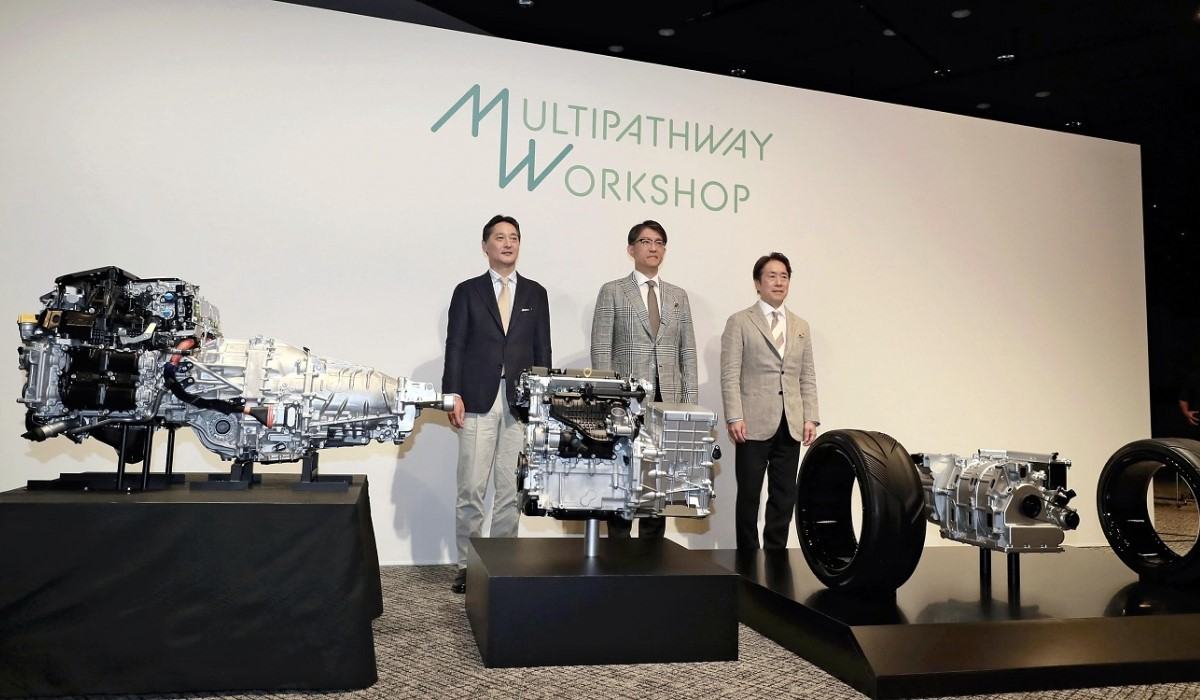Toyota Aims to Boost Competitiveness with New Engines for Hybrid Vehicles; Mazda, Subaru Also Working to Develop New Engines

From left, Subaru Corp. President Atsushi Osaki, Toyota Motor Corp. President Koji Sato and Mazda Motor Corp. President Masahiro Moro attend a press conference in Shibuya Ward, Tokyo, on Tuesday.
17:31 JST, May 29, 2024
Toyota Motor Corp.’s plan to develop new engines for its hybrid (HV) and plug-in hybrid (PHV) vehicles is aimed at boosting the company’s competitiveness in the market for environmentally friendly vehicles by refining its engine technology amid sluggish sales of electric vehicles.
Multipath strategy
The automaker plans to develop two types of engines — a 1.5-liter and a 2-liter — aiming to increase power while making it 10% more compact.
By making the engine smaller, Toyota said it can improve fuel economy by 12% with the 1.5-liter engine, by allowing the automaker to have more freedom in designing a more aerodynamic body.
Toyota also envisions that the new engines will be designed to run on carbon-neutral fuels. These include plant-based biofuels and e-fuel, which is made by synthesizing carbon dioxide and hydrogen.
While Toyota plans to increase global EV sales to 3.5 million units by 2030, it has also announced a multipath strategy of offering different types of electrified vehicles, including HVs and PHVs.
“We’ll develop engines optimized for the electrification era,” Toyota President Koji Sato said at a press conference in Tokyo on Tuesday.
Moving at similar pace
Mazda Motor Corp. and Subaru Corp., which have capital ties with Toyota, are also proceeding at a similar pace in developing engines for the age of electrification.
Subaru is developing a new hybrid system using its unique horizontally opposed engine and plans to begin production of vehicles using the engine in autumn 2024.
Mazda, for its part, plans to develop a new vehicle using a rotary engine, which has been revived as a generator for PHVs.
Toyota, Mazda and Subaru will each proceed with developing engines and other components individually, but they will consider sharing information.
Concern for parts suppliers
The three companies’ focus on engine development stems partly from their concerns for their affiliated parts suppliers.
With EVs estimated to require only about two-thirds of the parts used in gasoline-powered vehicles, automakers are concerned that they will not be able to keep their suppliers in business as the shift toward EVs continues.
Demand for EVs has been slowing down at home, but they are expected to become more widespread around the world in the mid- to long term.
Sato expressed his intention to work with auto parts suppliers to explore the future of electrified vehicles.
“We will change the future together and take responsibility for what kind of future we will create,” Sato said.
In response to the decarbonization trend, manufacturers such as Tesla Inc. of the United States and BYD Co. of China have rapidly emerged in the EV market.
However, EVs have issues to solve, such as high prices and a lack of infrastructure to recharge vehicles. As a practical solution, HVs and PHVs, which are less expensive and have a longer driving range than EVs, are being reevaluated worldwide.
Meanwhile, Honda Motor Co. wants all of its new vehicle sales to be EVs or fuel cell vehicles (FCVs) by 2040. The automaker has been expanding sales in the North American market, saying that global sales of HVs could grow from the current 850,000 units per year to 1.8 million units per year.
Nissan Motor Co., which is focusing on EVs, also plans to launch a new PHV in the North American market.
Top Articles in Business
-

Prudential Life Insurance Plans to Fully Compensate for Damages Caused by Fraudulent Actions Without Waiting for Third-Party Committee Review
-

Narita Airport, Startup in Japan Demonstrate Machine to Compress Clothes for Tourists to Prevent People from Abandoning Suitcases
-

Japan, U.S. Name 3 Inaugural Investment Projects; Reached Agreement After Considerable Difficulty
-

Toyota Motor Group Firm to Sell Clean Energy Greenhouses for Strawberries
-

SoftBank Launches AI Service for Call Centers That Converts Harsh Customer Voices into Softer Voices
JN ACCESS RANKING
-

Japan PM Takaichi’s Cabinet Resigns en Masse
-

Japan Institute to Use Domestic Commercial Optical Lattice Clock to Set Japan Standard Time
-

Israeli Ambassador to Japan Speaks about Japan’s Role in the Reconstruction of Gaza
-

Man Infected with Measles Reportedly Dined at Restaurant in Tokyo Station
-

Videos Plagiarized, Reposted with False Subtitles Claiming ‘Ryukyu Belongs to China’; Anti-China False Information Also Posted in Japan























